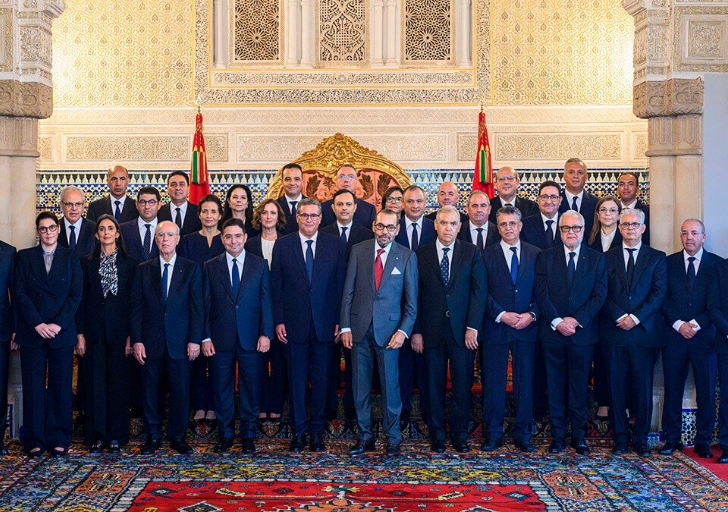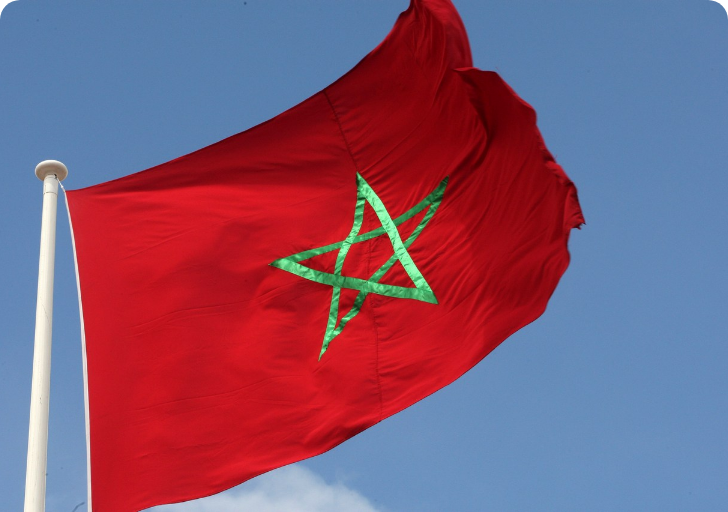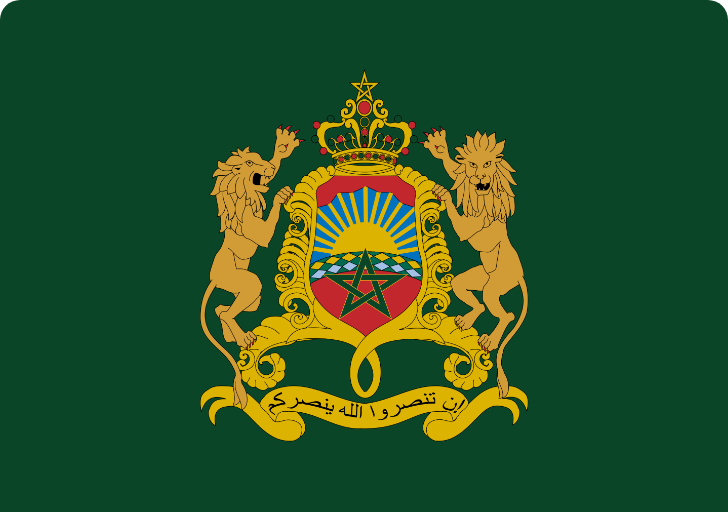HM the King Sends Message to Chairman of Committee on the Exercise of the Inalienable Rights of the Palestinian People
HM King Mohammed VI sent on Thursday a message to the Chairman of the Committee on the Exercise of the Inalienable Rights of the Palestinian People Cheikh Niang, on the occasion of the International Day of Solidarity with the Palestinian People.
Here follows the full text of the message:
Your Excellency Cheikh Niang, Chairman of the Committee on the Exercise of the Inalienable Rights of the Palestinian People,
Ladies and Gentlemen,
First of all, I should like to congratulate Cheikh Niang on the trust placed in him, as evidenced by his election as the new Chairman of the Committee on the Exercise of the Inalienable Rights of the Palestinian People. I also wish to pay tribute to his predecessor, Ambassador Fodé Seck, for a successful term as Chairman of the Committee.
Allow me to express my thanks and appreciation to our sister nation, Senegal, and to the Chair and distinguished members of the Committee for their sincere, tireless efforts to support the just cause of Palestine and of Al-Quds Al-Sharif.
I have been following with keen interest the resolute efforts made by the United Nations Committee on the Exercise of the Inalienable Rights of the Palestinian People as well as the Committee's supervision of a number of practical programs aimed at enabling the Palestinian people to achieve their inalienable rights, as a prelude to gaining their legitimate national independence and ensuring their sovereignty.
In recent years, there has been a major leap forward in the Committee’s work and in its endeavors to live up to its responsibilities with regard to the just Palestinian cause. However, this year's celebration of the International Day of Solidarity with the Palestinian People has special significance in that it takes place amid sensitive and complex regional and international events which have a bearing on both the Palestinian cause and the question of Al-Quds. These unprecedented circumstances are due to rapid and serious developments which could potentially exacerbate the suffering of our Palestinian brothers and sisters.
Last June, the Kingdom of Morocco had the honor of hosting the Fifth International Conference on Al-Quds, and we took that opportunity to underscore the defining elements which determine Morocco’s position on Al-Quds and on the Palestinian question in general – an issue which is at the heart of the conflict in the Middle East.
Against the backdrop of challenges in connection with the Palestinian question, I think the important outcome of that conference can be critical in terms of guiding regional and international efforts aimed at highlighting Palestinian rights and defending the legitimate aspirations of the Palestinian people.
Ladies and Gentlemen,
The Moroccan people’s relationship with Palestine, and in particular Al-Quds, is neither new nor fortuitous. It is an emotional relationship which is deeply rooted in the imagination of Moroccans, as individuals and as a nation.
Moroccan pilgrims traveling to Mecca and Madinah used to visit the Holy City of Al-Quds - home to the Mosque of the two Qiblas and the Third Holy Mosque - given the city’s religious and spiritual significance. No wonder then that many of them, including scholars, mystics and merchants, chose to settle in Al-Quds and protect the holy places there.
Therefore, the question of Al-Quds and that of Palestine have always been a major concern for the following reasons:
• It is a question of commitment and responsibility towards a just and legitimate cause;
• The case of Palestine is a central issue in the Middle East and is at the heart of the conflict in the region.
• Achieving a just, comprehensive and lasting peace on the basis of the two-state solution and in accordance with Security Council resolutions and the Arab Peace Initiative is a strategic choice - not a political maneuver;
• The issue of Al-Quds has special significance, not only for the Arab and Muslim Ummah - given that the Holy city is home to the blessed Al-Aqsa Mosque - but also for all peace-loving people, given that the city stands for tolerance and inter-faith coexistence;
• Any unilateral actions affecting Al-Quds are both unacceptable and illegal; they represent a serious violation of international law, including United Nations resolutions, Security Council Resolutions 476 and 478 of 1980, and the 2017 "Uniting for Peace" Resolution, adopted by the tenth Emergency Special Session of the United Nations General Assembly;
• Resolving the Palestinian issue on the basis of the resolutions of international legitimacy would deprive extremist and terrorist groups of their arguments, especially as they have been exploiting the lack of prospects for the settlement of the Palestinian issue and of that of Al-Quds, using this as a pretext to justify their criminal agenda in the region;
• the illegal measures taken in Al-Quds might fuel religious sentiment, given the spiritual character of the Holy City, with the potential risk of turning a political conflict into a religious one. This would be extremely dangerous for global peace and security and for the desired harmony and coexistence between different cultures and civilizations.
Ladies and Gentlemen,
The Palestinian struggle for freedom and independence and for the establishment of an independent Palestinian state, with East Jerusalem as its capital, has lasted all these years due to the lack of justice, to widespread frustration and to the suffering caused by occupation and injustice.
Allow me to stress, in this regard, that the greatest challenge facing the international community is the implementation of the resolutions supporting the Palestinian cause, which are adopted by the highest international authority entrusted with ensuring the maintenance of international peace and security - namely the UN Security Council - and states’ commitment to uphold these resolutions.
Is it acceptable for UN Security Council resolutions on Palestine to be disregarded or not to be implemented, especially Resolution 2334 (2016), which reaffirms that the establishment of settlements in the Palestinian territory occupied since 1967, including East Jerusalem, has no legal validity, and that it constitutes a flagrant violation under international law and represents a major obstacle to the achievement of the two-State solution as well as a just, comprehensive peace?
Ladies and Gentlemen,
Talking about Palestine would be a mission only half finished if the suffering of the Palestinian people in the Gaza Strip were not addressed, given the unjust blockade which has been maintained for years.
Aware of the difficult circumstances Palestinians are facing in Gaza, Morocco has spared no effort to assist them. This is fully in line with my country’s commitment to solidarity, which is a longstanding feature of our foreign policy. I therefore ordered the airlift of medical and food aid on two occasions, in 2009 and 2014.
This year, during the holy month of Ramadan, I personally supervised the launching of a humanitarian initiative for the benefit of the Gaza Strip, which was later expanded to include Al-Quds Al-Sharif and Ramallah.
I also instructed the Moroccan Royal Armed Forces to set up a field hospital in the Gaza Strip, offering a range of medical specialties, such as pediatrics, orthopedics, gastroenterology, ophthalmology and otorhinolaryngology.
These initiatives for the benefit of our Palestinian brothers and sisters complement my action as Chairman of the Organization of Islamic Cooperation’s Al Quds Committee. This action builds on political and diplomatic endeavors at the bilateral level, in international forums and through field work carried out by the Bayt Mal Al-Quds al-Shareef Agency. This operational mechanism affiliated with the Al-Quds Committee acts under my personal supervision and carries out concrete projects and plans in the areas of housing, healthcare, education and social services for the benefit of the inhabitants of Al-Quds. These projects are aimed at safeguarding the cultural identity of the Holy City, improving the social and living conditions of the inhabitants of Al-Quds, supporting their struggle and encouraging them to remain in the Holy City.
Ladies and Gentlemen,
As we monitor the situation in the occupied Palestinian territories, we cannot but add our voice to that of the United Nations, whose Special Coordinator for the Middle East Peace Process has been warning that the West Bank and the Gaza Strip are on the verge of collapse due to the continuing blockade and worsening socioeconomic indicators. This situation may lead to further violence and strife, dash hopes for peace and wipe out prospects for the establishment of an independent, fully sovereign Palestinian State.
In the face of challenges and obstacles impeding the achievement of the just and legitimate rights of the Palestinian people, the international community must keep hope alive and continue to work tirelessly until the Palestinian people enjoy their rights, obtain their independence, set up their independent state along the lines of 4 June 1967, with East Jerusalem as its capital, and are able to exercise their right to return to their homes, in accordance with UN Resolution 194 and the Arab Peace Initiative.
However, one cannot talk about the challenges connected to the Palestinian question without referring to the division which continues to plague the Palestinian society.
Because the Kingdom of Morocco attaches special importance to the unity of Palestinian ranks, I have stressed, on many occasions, the need to end this state of division and to engage resolutely and in good faith in forming a national unity government. The latter would have to shoulder its responsibilities towards the Palestinian people and serve as the sole interlocutor, enjoying high credibility with the international community, in order to put an end to the suffering of the Palestinian people and to the injustice weighing on them.
Today, the Kingdom of Morocco is renewing its call for the reactivation of the reconciliation agreement and for the national unity government to be able to extend its mandate over all Palestinian territories in order to serve the Palestinian national project.
In this regard, allow me to reiterate the Kingdom of Morocco’s support for the choices made by our Palestinian brothers and sisters and by national Palestinian institutions under the leadership of His Excellency President Mahmoud Abbas.
In conclusion, I should like to extend my sincere thanks to the members and staff of the United Nations Committee for their commitment and perseverance. I urge them to keep up their committed efforts in order to mobilize international support for the benefit of the just Palestinian cause, and to help see to it that global public opinion is better informed about the legitimate rights of the Palestinian people.
I pray that Almighty God grant you every success and that He guide our steps to make justice and right prevail through the establishment of an independent, fully sovereign Palestinian State, with East Jerusalem as its capital, living side by side with Israel in peace and security, in accordance with international legitimacy resolutions and the Arab Peace Initiative.
MAP 29 November 2018







